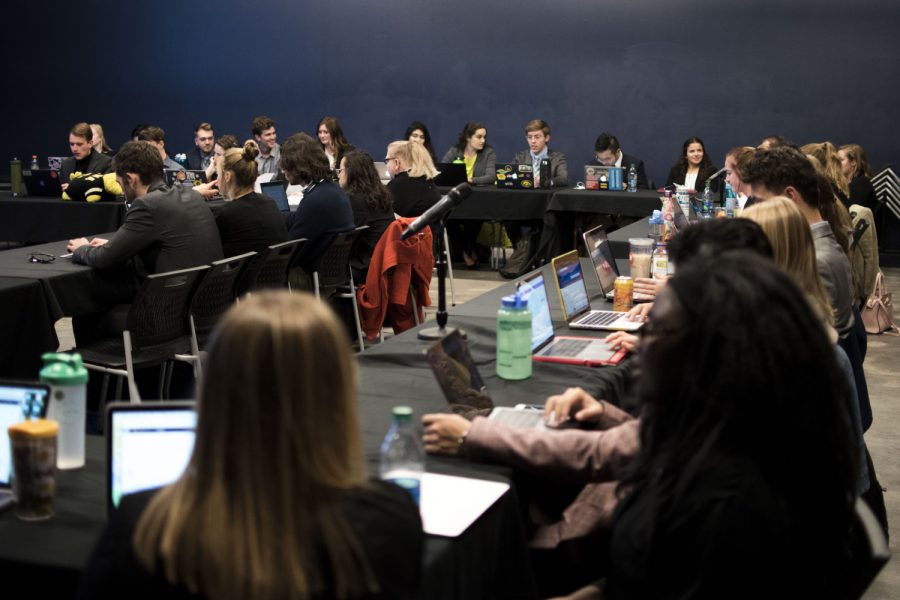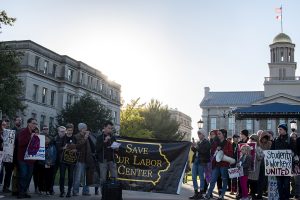First-Generation Summit Committee responds to UISG president’s veto
UISG’s First-Generation Summit Planning Committee issued a response to President Hira Mustafa’s veto of the legislation funding the summit.
Members of the UISG meet in the Black Box Theater on Tuesday, October 23, 2018.
February 19, 2019
The First-Generation Summit Planning Committee strongly urges the University of Iowa Student Government Senate to override the UISG president’s veto of legislation that would fund the second First-Generation Summit.
In a statement released Tuesday, the committee iterated support for legislation to fund the summit as the Student Senate passed on Feb. 12 for $23,200 with a maximum of $25,700. UISG Sens. Alexia Sánchez, Guowei Qi, and Oscar Rodriguez sponsored the bill.
“We would like to emphasize the power of the Student Senate as a separate but equal branch of UISG, address concerns surrounding the transparency and morals of the committee as a whole, and provide additional context surrounding the decisions made when carefully budgeting out the line items for costs, such as marketing, catering, and photography, in the interest of holding an affordable, attainable, and impactful First Generation Summit,” the statement read.
UISG President Hira Mustafa vetoed the bill last week, citing concerns with the budgeting and financial planning of the summit.
RELATED: UISG president vetoes First-Generation Summit legislation
Funding for the summit would come from UISG’s contingency fund, which is made up of funds from the Student Activity Fee. The fund currently contains more than $300,000, which must be spent down to between $120,000 and $6,000 dollars before the end of the legislative session in 60 days.
Mustafa proposed a budget reduction of $3,986 in the areas of catering, photography, and marketing in her veto of the bill. The summit committee responded to Mustafa’s concerns regarding the amount being spent in its statement.
The committee defended the decision to cater a served rather than buffet lunch at the summit, citing concerns that a buffet lunch would take too much time away from the summit.
Following Mustafa’s concerns that the $556 budget line item for name tags was too expensive, the summit committee said it plans to reuse as many lanyards and name tags from the previous year’s summit as possible and ideally spend no money on that line item.
The most contentious budget item is the $1,000 dollars allocated for photography. The committee defended its decision to use an external photographer instead of UISG’s communications and marketing team in its statement.
“The [committee] believes that a great way to promote the campaign is to work with a student photographer that matched the style the [committee] was looking for this year’s celebratory theme,” the committee said. “This year, we made an effort for the[committee] to be made up of UISG senators, UISG executives, and other student leaders outside of UISG. We extended an invitation to an external student photographer to maintain the theme of campus-wide collaboration when planning and executing the Summit.”
RELATED: UI Student Government senators could override president’s vetoes
In her veto statement, Mustafa said the $1,000 dollars allocated for photography was a misuse of student dollars.
The committee emphasized no legally binding contract was ever created with the outside photographer, and use of an outside photographer at UISG events is not unprecedented.
The committee has circulated a petition in support of the First-Generation summit, which has received more than 100 responses from students, faculty, staff, alumni, and community members.
“As a First-Generation Hawkeye Alumni, I am incredibly [disappointed] in [Mustafa’s] decision to veto the funding bill for the First-Generation Summit,” said a survey respondent said. “I agree that UISG should increase its focus on the responsible use of student funds, however, there is nothing irresponsible about funding an event that provides an opportunity to highlight the plights of an underrepresented community.”
Read the committee’s response in full here






